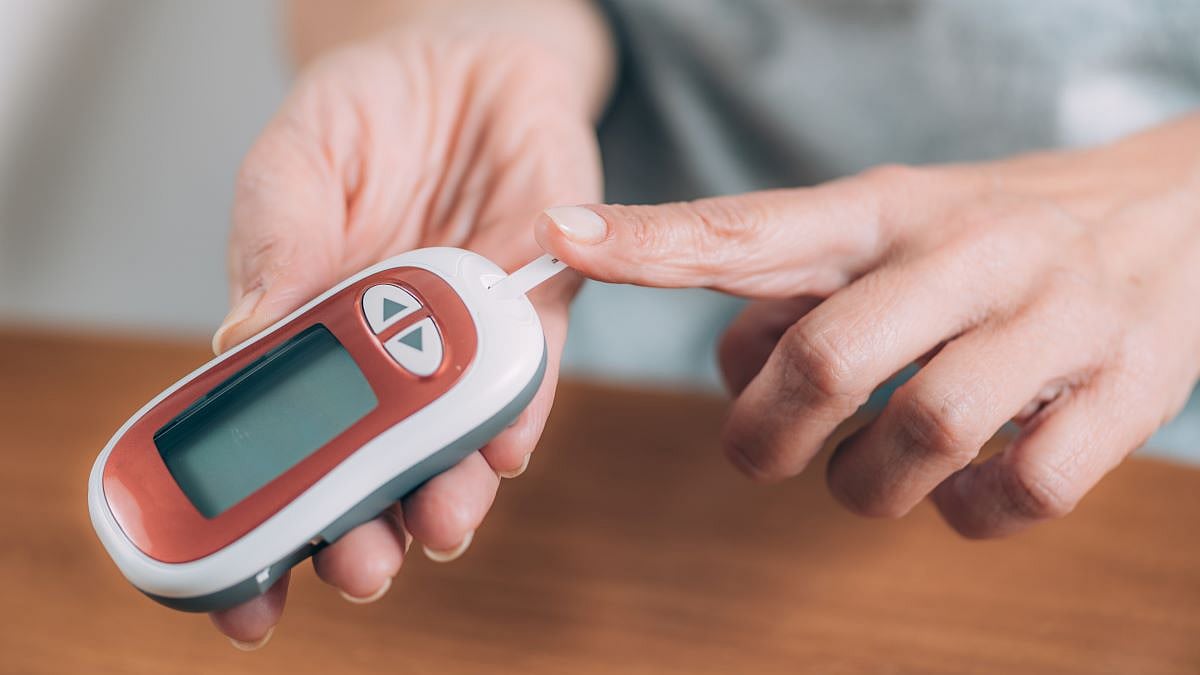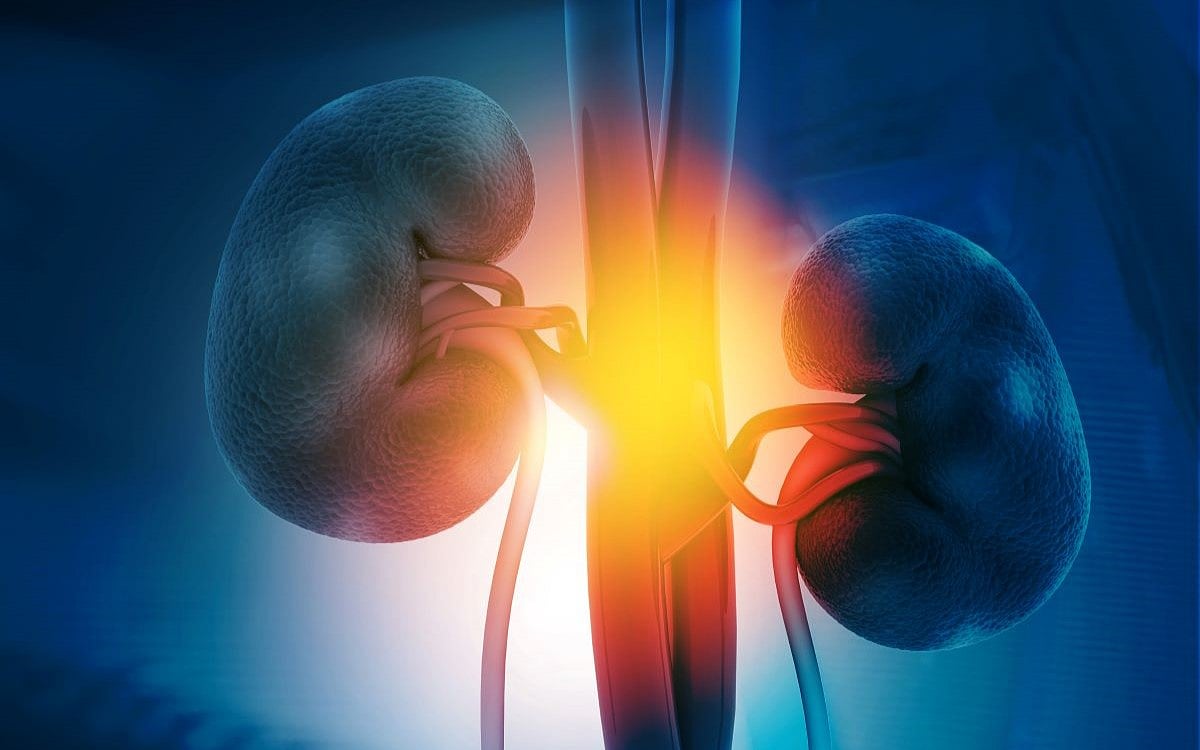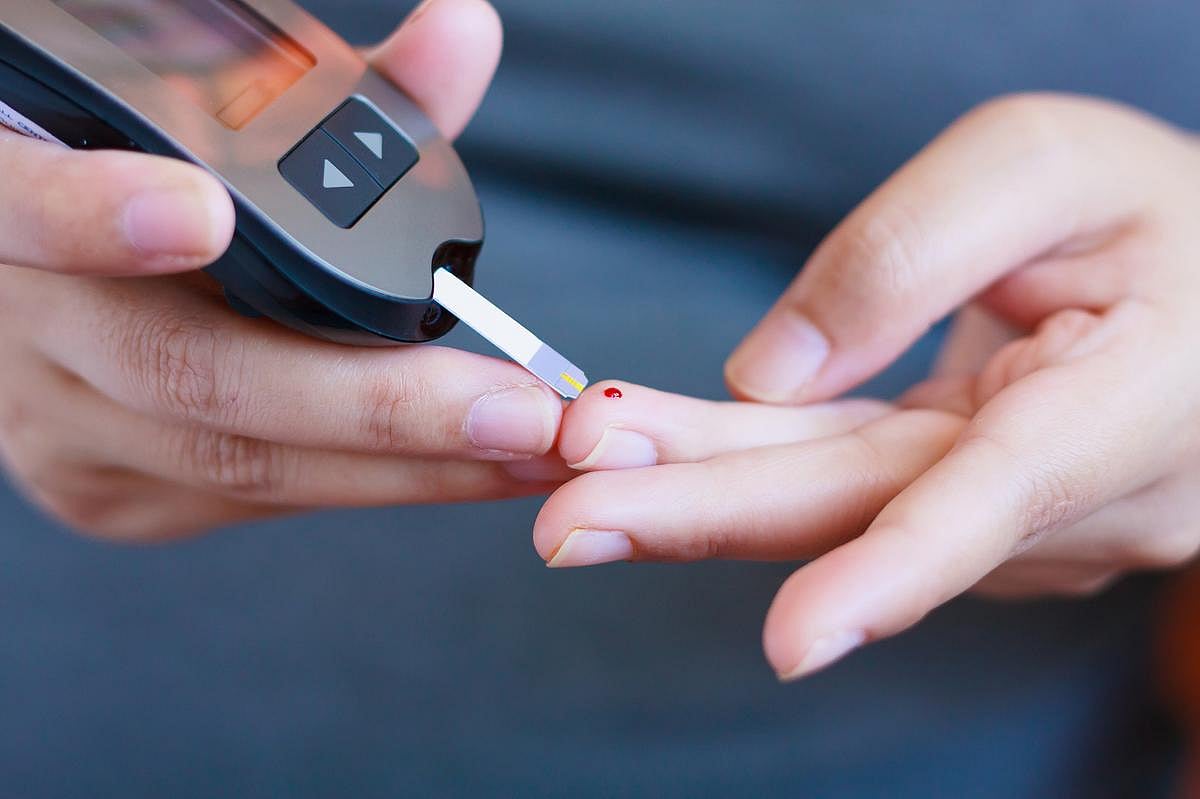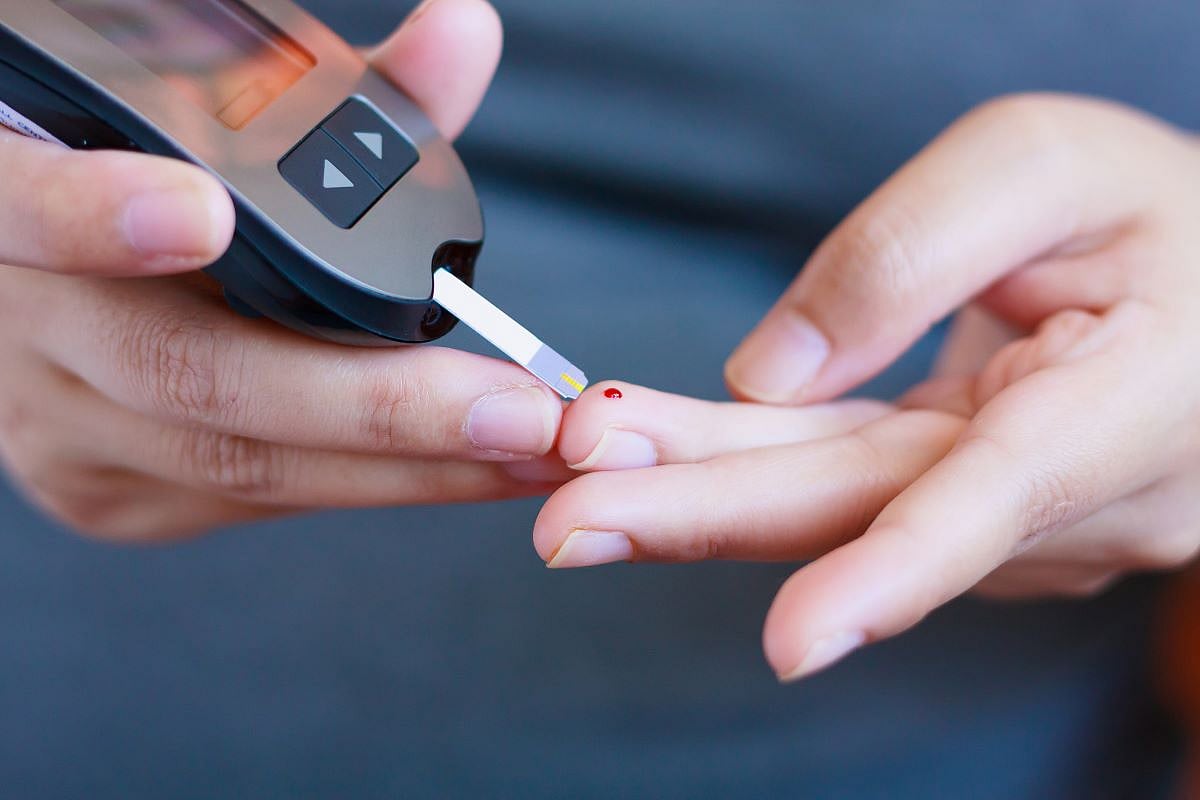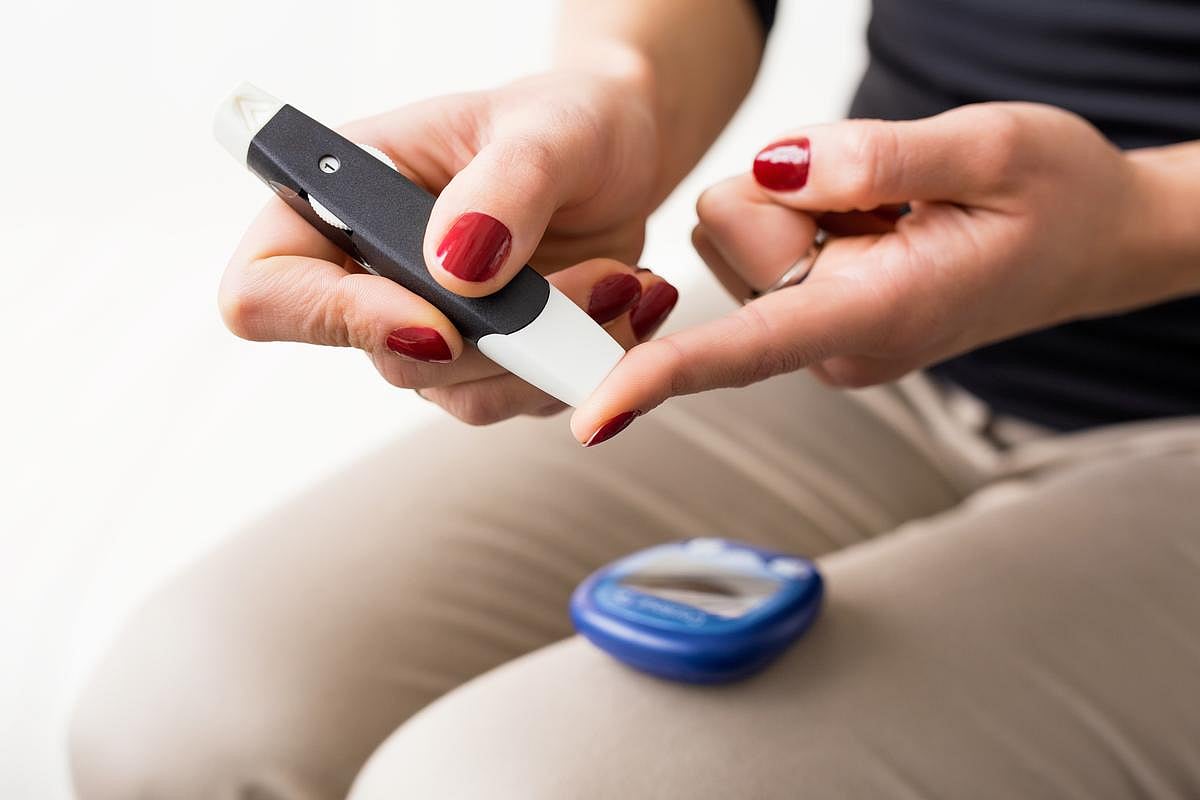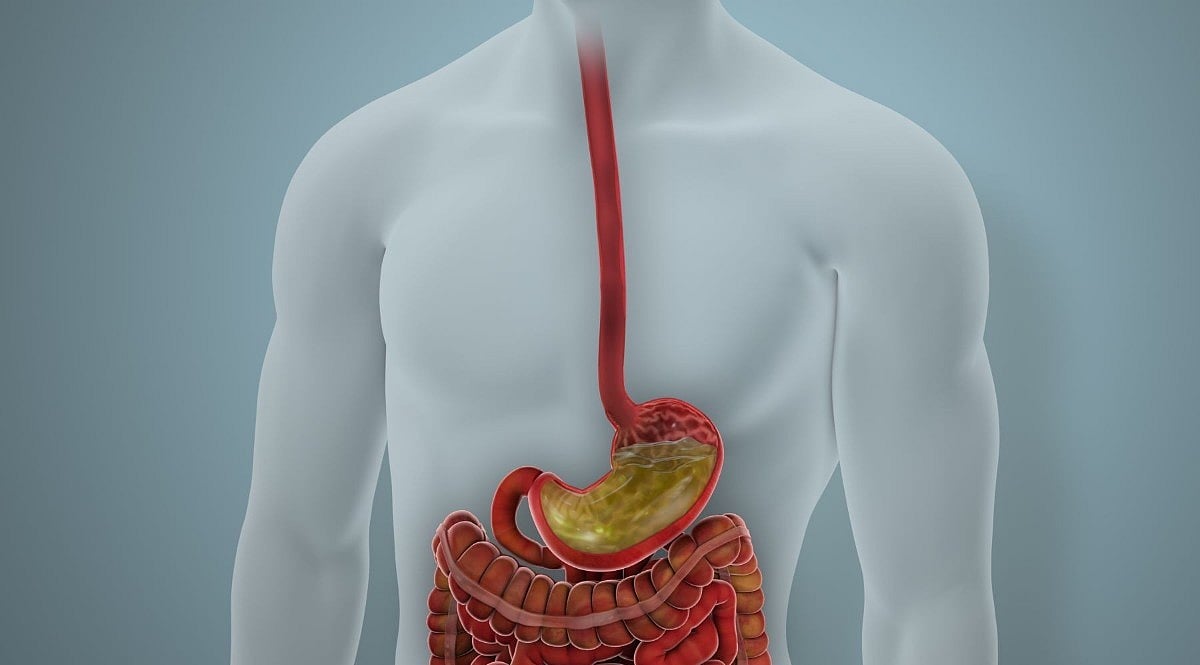Patient Resources
Get Healthy!
Results for search "Diabetes: Type II".
Health Videos - 10
Hearing Loss a Major Concern in Type 2 Diabetes
A new study finds people with type 2 diabetes are four times more likely to develop significant hearing loss over time.
90% of Americans at Risk for Newly Defined Health Condition Called CMK Syndrome
CMK syndrome links heart, kidney and metabolic risk factors and the American Heart Association says it’s extremely common in U.S. adults.
Marijuana Use May Spike Type 2 Diabetes Risk
A new study finds pot users are nearly 4 times more likely to develop type 2 diabetes compared to the general public.
GLP-1 Medications in Kids: Promising Health Results, Ongoing Safety Concerns
A new study finds children and teens with obesity or diabetes who take GLP-1 weight-loss medications experience significant improvements in many cardiometabolic risk factors, but long-term safety questions remain.
The Truth About Potatoes and Diabetes Risk
A new study finds eating too many French fries ups the odds of type 2 diabetes but swapping them for whole grains offers protection from the common blood sugar condition.
‘Forever Chemicals’ Linked to Higher Risk of Type 2 Diabetes
A new study finds exposure to PFAS may disrupt the body’s metabolism -- increasing the risk for type 2 diabetes.
GLP-1 Weight Loss Drugs May Lower the Risk for 14 Obesity-Related Cancers
A new study finds women taking GLP-1 Receptor agonists were significantly less likely to develop obesity-related cancers.
Popular Weight Loss Drugs Do Not Increase the Risk of Depression, Anxiety or Suicidal Ideation, Study Finds
In a new study, researchers found no association between treatment with GLP-1 Receptor Agonists like Ozempic and Wegovy and increased risk of adverse psychiatric events.
Are Continuous Glucose Monitors Giving Inaccurate Info to Health-Conscious Adults?
A new study finds healthy adults using CGMs are getting info that could lead to harmful dietary choices.
Nutrient Deficiencies Common in People with Type 2 Diabetes
A new study finds nearly half of people with type 2 diabetes suffer from multiple nutrient deficiencies
Health News Results - 119
People With Diabetes Face Dramatically Higher Odds Of Sudden Cardiac Death
- Dennis Thompson HealthDay Reporter
- December 4, 2025
- Full Page
THURSDAY, Dec. 4, 2025 (HealthDay News) — Diabetes can be literally heart-stopping, a new study asserts.
People with either type 1 or type 2 diabetes have a dramaticall...
Ultra-Processed Foods Linked To Diabetes Risk In Young Adults
- Dennis Thompson HealthDay Reporter
- November 13, 2025
- Full Page
Chowing down on ultra-processed foods – fast food, packaged snacks, heat-and-eat meals – increases young adults’ risk of health problems that contribute to diabetes, a new study ...
Healthy Habits Slash Genetic Dementia Risk in Adults with Type 2 Diabetes
- Deanna Neff HealthDay Reporter
- November 5, 2025
- Full Page
New research suggests that those with type 2 diabetes (T2D) and a genetic risk for dementia can significantly lower their odds for cognitive problems by adopting a heart...
Low-Dose Aspirin Might Benefit Adults With Type 2 Diabetes, Study Says
- Dennis Thompson HealthDay Reporter
- November 4, 2025
- Full Page
Low-dose aspirin is no longer universally recommended to prevent heart health emergencies, but it might help people with type 2 diabetes, a new study says.
People with type 2 diabetes<...
New Diagnosis Code For Patients with Type 2 Diabetes in Remission
- Deanna Neff HealthDay Reporter
- October 15, 2025
- Full Page
Use lifestyle interventions to show no signs of type 2 diabetes for at least three months? There’s a code for that: E11.A.
Starting Oct. 1, 2025, a new diagnosis code was added to the detailed list of codes used by health care providers: the remission of
Sepsis Risk Doubled With Type 2 Diabetes
- Dennis Thompson HealthDay Reporter
- September 19, 2025
- Full Page
Type 2 diabetes appears to double a person’s risk for life-threatening sepsis, a new study says.
Men and people under 60 with diabetes are particularly at risk for sepsis, a condition in which the immune system overreacts to infection, researchers reported this wee...
Can Weed Increase Risk Of Type 2 Diabetes?
- Dennis Thompson HealthDay Reporter
- September 16, 2025
- Full Page
Weed might nearly quadruple a person’s risk of developing type 2 diabetes, a new study says.
People who use cannabis have a 3.7 times greater risk of type 2 diabetes compared...
Smoking Increases Risk Of Type 2 Diabetes
- Dennis Thompson HealthDay Reporter
- September 15, 2025
- Full Page
Smokers have a higher risk of developing type 2 diabetes, especially if they are genetically predisposed to the condition, a new study says.
People who ever smoked at all have an e...
Breath Test For Diabetes Under Development
- Dennis Thompson HealthDay Reporter
- August 27, 2025
- Full Page
Detecting diabetes might soon be as easy as breathing into a device, a new study says.
An experimental breath test sorted out type 2 diabetes patients from healthy people, based on...
Mediterranean Diet Can Protect Against Type 2 Diabetes
- Dennis Thompson HealthDay Reporter
- August 26, 2025
- Full Page
A Mediterranean-style diet can significantly decrease risk of type 2 diabetes in people who are overweight or obese, a new study says.
People had 31% lower odds of diabetes if the...
Diabetes Risk Clusters In Households
- Dennis Thompson HealthDay Reporter
- August 19, 2025
- Full Page
Diabetes risk appears to cluster in households, a new study says.
Three-quarters of people at risk for developing type 2 diabetes are living under the same roof as another person w...
French Fries Linked to Higher Odds for Type 2 Diabetes
- Ernie Mundell HealthDay Reporter
- August 7, 2025
- Full Page
The next time you’re asked "Fries with that?," maybe say no: Regular consumption of the potato-based treat raises your odds of type 2 diabetes by 20%, new research shows.
On the ...
PFAS 'Forever Chemicals' Linked To Type 2 Diabetes
- HealthDay Reporter
- Dennis Thompson
- July 23, 2025
- Full Page
So-called “forever chemicals” could be increasing Americans’ risk of developing type 2 diabetes, a new study says.
Higher blood levels of per- and polyfluoroalkyl...
Blood Pressure Diet Helps Type 2 Diabetics
- HealthDay Reporter
- Dennis Thompson
- June 17, 2025
- Full Page
A diet meant to lower blood pressure also can be effective in treating type 2 diabetes after a few tweaks, a new clinical trial indicates.
The DASH (Dietary Approaches to Stop Hype...
Combo Drug Treatment More Effective For Kidney Disease in Type 2 Diabetics
- HealthDay Reporter
- Dennis Thompson
- June 9, 2025
- Full Page
Prompt treatment with a drug combo can effectively manage chronic kidney disease in people with type 2 diabetes, a new clinical trial shows.
Patients prescribed the combination of ...
Combo Diabetes/High Blood Pressure Threatening More American Lives
- HealthDay Reporter
- Dennis Thompson
- May 30, 2025
- Full Page
Twice as many Americans now face the increased risk of death that comes from having both high blood pressure and type 2 diabetes, a new study reports.
About 12% of the U.S. populat...
Diet Drinks, Processed Foods Might Increase Type 2 Diabetes Risk
- HealthDay Reporter
- Dennis Thompson
- April 9, 2025
- Full Page
Food additive mixtures commonly found in diet drinks, soups, dairy desserts and sauces may slightly increase a person’s risk of type 2 diabetes, a new study says.
A mixture o...
Smartwatches Can Help People Control Diabetes Through Exercise
- HealthDay Reporter
- Dennis Thompson
- March 31, 2025
- Full Page
Wearing a smartwatch might do more than track steps (or your texts) -- it could be a powerful tool for helping people with type 2 diabetes stay active, a new study says.
Participan...
Turning Off TV Better For Heart Health Of Folks Predisposed To Diabetes
- HealthDay Reporter
- Dennis Thompson
- March 13, 2025
- Full Page
People with a higher genetic risk for type 2 diabetes also have a higher risk of heart attack, stroke and other heart-related diseases.
But controlling that risk could be as simple as picking up a TV remote and hitting the “off” switch, a new study suggests.<...
Vitamin Deficiencies Common in Type 2 Diabetes
- HealthDay Reporter
- Dennis Thompson
- January 29, 2025
- Full Page
“Hidden hunger” -- low levels of essential vitamins or minerals -- is common among people with type 2 diabetes, a new evidence review says
Overall, as many as 45% of ty...
Certain Meds and Diet Can Reverse Type 2 Diabetes
- HealthDay Reporter
- Dennis Thompson
- January 24, 2025
- Full Page
People can reverse their type 2 diabetes through a combination of calorie cutting and medication, a small clinical trial says.
Overweight and obese adults caused their diabetes to ...
High-Dose Vitamin D Supplements Won't Prevent Diabetes in Healthy Seniors
- HealthDay Reporter
- Ernie Mundell
- December 4, 2024
- Full Page
Taking even high doses of supplementary vitamin D won't lower an older person's odds for type 2 diabetes, new research confirms.
Vitamin D supplements may have other benefits, but ...
Earlier Type 2 Diabetes Diagnoses Bring Higher Odds for Dementia
- HealthDay Reporter
- Carole Tanzer Miller
- November 20, 2024
- Full Page
A type 2 diabetes diagnosis before age 50 comes with a health risk that patients might not expect.
Especially if they are obese, these folks are more likely to develop dementia later, new research warns.
"Our study suggests that there may be a cognitive consequence...
More Than 800 Million People Worldwide Now Have Diabetes
- HealthDay Reporter
- Ernie Mundell
- November 14, 2024
- Full Page
Fourteen percent of the world's people -- more than 800 million -- now have diabetes, a doubling of the global rate for the blood sugar disease since 1990, new statistics show.
Gum Disease & Diabetes: A Strong Link
- HealthDay Reporter
- Ernie Mundell
- November 14, 2024
- Full Page
Periodontal (gum) disease and diabetes are locked in a grim partnership aimed at undermining your health, experts warn.
“Recent research has shown that diabetes is not only a major risk factor for periodontitis but that the relationship between the two conditions i...
Diabetes & Kidney Trouble Can Bring Heart Disease Decades Earlier
- HealthDay Reporter
- Dennis Thompson
- November 11, 2024
- Full Page
People with both type 2 diabetes and chronic kidney disease face a heart health double-whammy, a new study says.
More Hot Flashes Could Mean Higher Odds for Type 2 Diabetes
- HealthDay Reporter
- Dennis Thompson
- November 4, 2024
- Full Page
Menopausal women with frequent hot flashes and night sweats are more likely to develop type 2 diabetes, a new study warns.
Middle-aged women who regularly suffer those well-known symptoms of
Cutting Back on Carbs Could Help Folks With Type 2 Diabetes
- HealthDay Reporter
- Ernie Mundell
- October 23, 2024
- Full Page
Type 2 diabetes is caused in part by the failure of pancreatic beta cells to respond as they should to blood sugar.
Now, new research suggests that switching to a low-carbohydrate diet might correct that beta cell dysfunction, boosting patients' health.
"People wit...
Dad's Use of Diabetes Med Metformin Won't Raise Birth Defect Risk
- HealthDay Reporter
- October 17, 2024
- Full Page
A new, reassuring study finds that men can take the diabetes drug metformin without worrying that their offspring will suffer from birth defects.
Re...
Ozempic Plus Intestinal 'Zap' Therapy May Eliminate Need for Insulin in Type 2 Diabetics
- HealthDay Reporter
- Ernie Mundell
- October 14, 2024
- Full Page
Results from a very small study suggest that a combination of the diabetes drug Ozempic and an innovative new intestinal procedure could help erase the need for insulin in folks with type 2 diabetes.
The new trial hasn't yet been published in a peer-reviewed journal and...
Weekly Insulin Injections As Effective for Diabetes as Daily Shots, Studies Show
- HealthDay Reporter
- Dennis Thompson
- September 11, 2024
- Full Page
Weekly insulin shots can help control both type 1 and type 2 diabetes as well as daily injections do, a pair of clinical trials have found.
A new class of insulin called efsitora alfa has be...
Chronic Steroid Use Could Raise Diabetes Risk
- HealthDay Reporter
- Dennis Thompson
- September 10, 2024
- Full Page
Taking steroids more than doubles a person’s risk of developing type 2 diabetes, a new study warns.
Patients taking steroid pills, injections o...
Asthma Risk Doubles in People With Diabetes
- HealthDay Reporter
- Dennis Thompson
- September 10, 2024
- Full Page
People with type 2 diabetes are nearly twice as likely to develop asthma, a new review has concluded.
Type 2 diabetics are 83% more likely to develop...
'Night Owls' More Prone to Type 2 Diabetes
- HealthDay Reporter
- Dennis Thompson
- September 9, 2024
- Full Page
Folks who like to stay up late are nearly 50% more likely to develop type 2 diabetes than those who go to bed earlier, a new study finds.
However, it...
Everything You Need to Know About Insulin
- HealthDay Reporter
- Robin Foster
- August 31, 2024
- Full Page
Insulin can be a critical part of managing diabetes, but patients may not know all of the ins and outs of using the medication effectively.
Luckily, the American Diabetes Association (ADA) has plenty of information and tips on using insulin.
First, there are differ...
Diabetes Can Age Your Brain, But Lifestyle Change Can Reverse That
- HealthDay Reporter
- Ernie Mundell
- August 28, 2024
- Full Page
Diabetes can age the brain by up to four years, a new study based on MRI scans shows.
There was one silver lining: Healthy lifestyle changes could help prevent that neurological aging, the Swedish researchers said.
“Having an older-appearing brain for one&rsq...
Number of Americans With Type 2 Diabetes Jumped by 20% in a Decade
- HealthDay Reporter
- Dennis Thompson
- August 22, 2024
- Full Page
Type 2 diabetes increased by nearly 20% in the United States between 2012 and 2022, with age, race, income level, obesity and lack of exercise a...
Red Meat Linked to Higher Odds for Type 2 Diabetes
- HealthDay Reporter
- Dennis Thompson
- August 21, 2024
- Full Page
Eating red meat and processed meat can increase a person’s risk of developing type 2 diabetes, a new review finds.
Regularly eating 50 grams of...
Free Meals at School May Boost Attendance, Lower Obesity Rates
- HealthDay Reporter
- Ernie Mundell
- August 21, 2024
- Full Page
A review of U.S. data from 2012 through 2024 finds that when kids get free school meals, there's a potential for a slight increase in attendance and a lowering of child obesity rates.
Even kids from higher-income households benefited, as many took advantage of wholesome ...
Why Red Meat May Be Especially Linked to Diabetes Risk
- HealthDay Reporter
- Dennis Thompson
- August 13, 2024
- Full Page
Red meat contains a type of iron that could increase a person's risk of type 2 diabetes, a new study warns.
People who ate the most foods high in hem...
Diabetes Run in Your Family? Diet, Exercise Can Still Prevent It
- HealthDay Reporter
- Dennis Thompson
- August 9, 2024
- Full Page
Folks can overcome their genetic risk for type 2 diabetes through healthy diet and regular exercise, a new study says.
Another Study Ties Poor Sleep to Type 2 Diabetes
- HealthDay Reporter
- Dennis Thompson
- July 23, 2024
- Full Page
Consistently bad sleep is linked to a person’s risk of developing type 2 diabetes, a new study shows.
Both too little and too much sleep is ti...
Irregular Sleep Could Raise Your Odds for Diabetes
- HealthDay Reporter
- Ernie Mundell
- July 17, 2024
- Full Page
WEDNESDAY, July 17, 2024 (HeathDay News) -- Sleeping long hours one night but only a few hours the next can be unhealthy, with a new study finding "irregular" sleep patterns could be a risk factor for
Some Diabetes Drugs May Lower Dementia Risk
- HealthDay Reporter
- Dennis Thompson
- July 15, 2024
- Full Page
Some diabetes drugs appear to lower the risk that people with type 2 diabetes will develop dementia or Alzheimer's disease, a
Bright Light at Night Could Raise Odds for Diabetes
- HealthDay Reporter
- Dennis Thompson
- June 27, 2024
- Full Page
Want to reduce your risk of type 2 diabetes? Avoid bright light at night, a recent study suggests.
More exposure to light at night, between 12:30 a.m. and 6 a.m., is linked to a higher risk of developing
Exposure to Plastics Chemical BPA May Raise Diabetes Risk
- HealthDay Reporter
- Dennis Thompson
- June 26, 2024
- Full Page
A common plastics chemical might increase a person's risk of diabetes, a new study warns.
People fed small doses of Bisphonol A (BPA) developed significantly worse insulin sensitivity within...
Feel Sick? Waiting at Least 2 Days Before COVID Test Is Best
- HealthDay Reporter
- Ernie Mundell
- June 26, 2024
- Full Page
The COVID virus, or rather people's immune response to it, has changed and it might be prudent to wait a couple days after symptoms start before taking a COVID test, researchers report.
"For COVID, we found that if you only have one test, it's best to wait two days after...
Cortisol Might Play Role in Tough-to-Treat Diabetes
- HealthDay Reporter
- Dennis Thompson
- June 26, 2024
- Full Page
The stress hormone cortisol appears to play a role in tough-to-treat type 2 diabetes, a new study finds.
About 1 in 4 people (24%) with tough-to-trea...
New Insights Into How Microbiome Helps Cause Type 2 Diabetes
- HealthDay Reporter
- Dennis Thompson
- June 26, 2024
- Full Page
A person's gut microbiome appears to increase their risk of developing type 2 diabetes, researchers claim.
Specific strains of gut microbes are more ...
Just 2 Servings of Red Meat Per Week Raises Your Diabetes Risk
- HealthDay Reporter
- Steven Reinberg
- October 19, 2023
- Full Page
Think twice about ordering that double cheeseburger, salami on rye or juicy T-bone.
Just two servings of red meat a week -- processed or unprocessed -- can increase your risk of type 2 diabetes by 62%, according to a





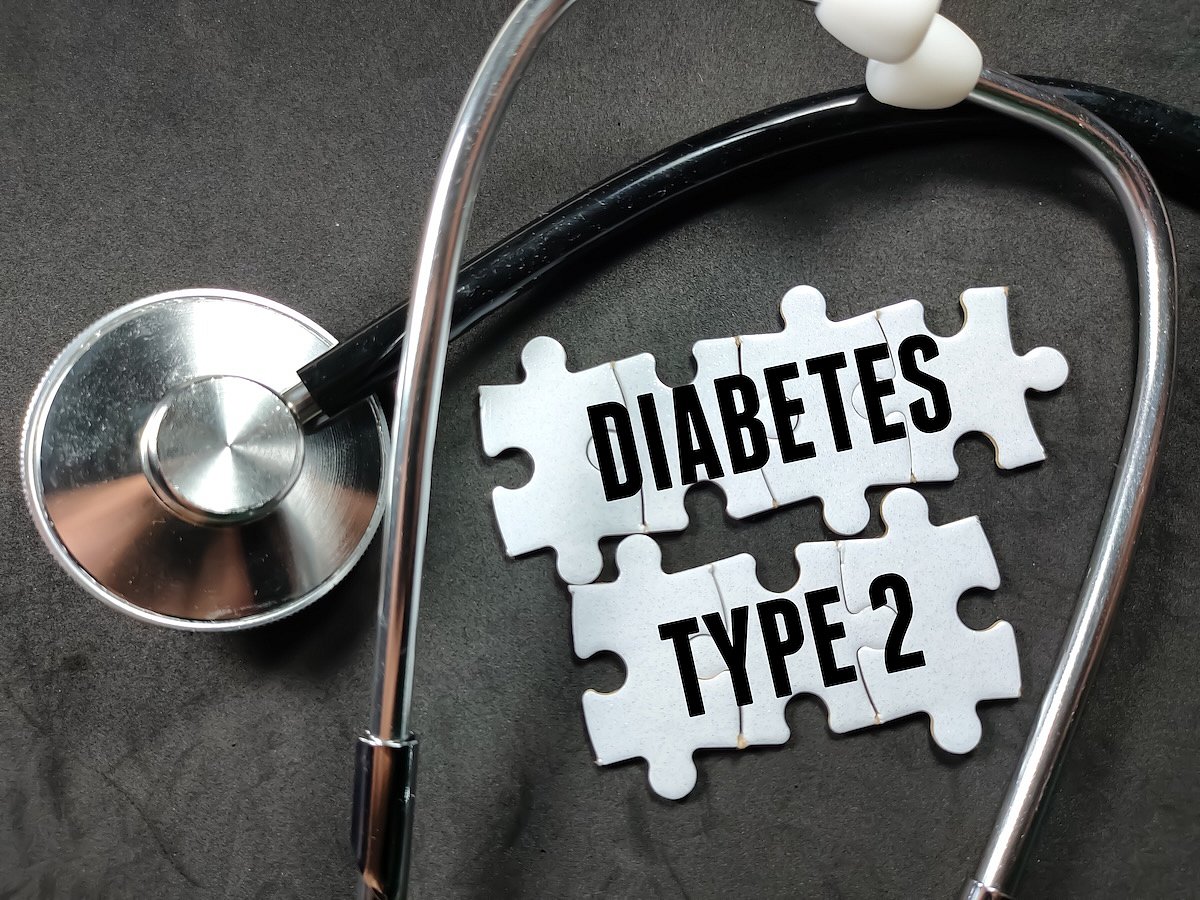
.jpg?w=1920&h=1080&mode=crop&crop=focalpoint)


